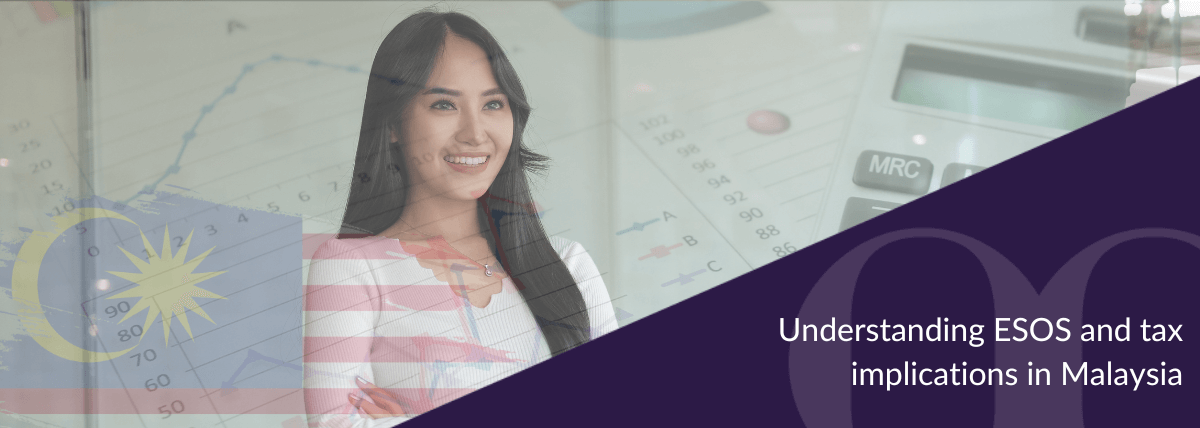Employee share option schemes (ESOS) have become increasingly popular among companies in Malaysia as a way to retain top talent and boost productivity. They offer employees the option to purchase company shares at a discounted price, which can result in a significant financial gain if the company performs well.
In this article, we will discuss the fundamentals of ESOS and why they are a valuable tool for employers. We will also examine the tax implications of ESOS in Malaysia; the regulatory bodies and laws governing ESOS taxation; and best practices for companies and C-suite leaders to achieve compliance and minimise tax liabilities.
What are ESOS?
ESOS are a form of employee compensation that allows employees to purchase company shares at a discounted price. These schemes are designed to incentivise employees to work productively and contribute meaningfully to the company’s success, as their financial gain is tied to the company share price movement. The higher the increase in share price, the larger the financial gain to the employees.
ESOS typically have a vesting period, meaning that employees must wait a certain amount of time before they can purchase shares. This period is intended to encourage employees to remain with the company longer and to align their interests with those of the company.
ESOS versus Employee Stock Ownership Plan (ESOP)
An ESOS (Employee Stock Option Scheme) and an ESOP (Employee Stock Ownership Plan) are both employee benefit programs that involve providing employees with a stake or ownership in the company.
However, there are some differences between the two:
- Nature of ownership
- Purpose
- Structure and funding
- Control and governance
Plan types such as restricted share plans and performance share plans all have different objectives but can all be categorised under long-term incentive plans.

Tax implications of ESOS in Malaysia
One of the most critical factors companies must consider when implementing ESOS is the tax implications for the business and their employees.
Failure to comply with tax regulations can result in significant financial penalties and reputational damage. Therefore, it is crucial that companies fully understand the tax requirements of ESOS in Malaysia and take steps to ensure compliance.
ESOS tax implications for employers and employees
ESOS can have different tax implications for both employers and employees.
For Malaysian employers, ESOS are usually considered a non-deductible expense for a company. Employers are required to report the value of the options granted to employees as an expense on their financial statements under Malaysian Financial Reporting Standard (MFRS) 2. The employer would also be required to deduct income tax from the amount of gain realised by the employee on the exercise of the option.
Employees who exercise their options to purchase shares are subject to income tax on the difference between the market value of the shares at the time of exercise and the option exercise price paid. The individual income tax rate in Malaysia varies depending on the chargeable income of the individual, with rates ranging from 0–30%.
Calculating ESOS tax liabilities
Companies must accurately calculate the tax liability associated with share options for both the employer and employee to ensure compliance.
Under MFRS 102, companies are required to recognise the fair value of the share-based payment as an expense in their financial statements. The fair value of the share-based payment is determined at the grant date, taking into account the exercise price, the term of the option, the current price of the underlying share and the expected volatility of the share price.
Once the fair value of the share-based payment has been calculated, it is recognised as an expense over the vesting period.

How to ensure ESOS compliance
In Malaysia, the regulation of ESOS is overseen by several government bodies, including the Securities Commission Malaysia and the Inland Revenue Board of Malaysia (IRBM).
Under Malaysian law, ESOS tax treatment varies depending on whether the option is granted to a local or foreign employee. Local employees are subject to Malaysian tax on the gain from exercising the option. In contrast, foreign employees are taxed only on the portion of the gain attributable to work done in Malaysia.
Penalties for non-compliance with ESOS taxation regulations can be severe. Companies that fail to comply with ESOS regulations may face fines, penalties and legal action from the authorities.
Best practices for C-suite leaders
C-suite executives can support ESOS compliance while minimising tax liabilities by implementing the following best practices in their organisation:
- Engage with tax experts who can provide guidance on the tax implications of ESOS and assist in accurately calculating tax liabilities for your business and your employees.
- Ensure compliance with all regulations and laws governing ESOS taxation in Malaysia.
- Develop a comprehensive understanding of the accounting for share options under MFRS 102. This accounting involves measuring the fair value of the options, recognising an expense in the income statement and recognising a liability in the balance sheet.
- Keep accurate records of all ESOS transactions and ensure that all employees are adequately informed and educated about the tax implications of their share options.

Common pitfalls to avoid
Despite the importance of compliance and accurate tax calculation, there are some common pitfalls that companies and C-suite leaders can encounter when it comes to ESOS taxation, including:
- failure to accurately calculate the tax liability associated with share options, which can result in underpayment or overpayment of taxes;
- incorrectly accounting for share options under FRS 102, which can lead to misstated financial statements and regulatory compliance issues; and
- failure to meet ESOS reporting obligations.
Woon Chee says it is not enough to ensure your company pays its ESOS taxes on time; it is also important to be aware of and fulfil the reporting requirements that follow. For example, she notes that “upon launching the ESOS, the employer has to notify the IRBM within 30 days after the expiry date of the period of acceptance of the offer.”
How to avoid pitfalls
To avoid these mistakes, it is crucial for companies to engage with an expert ESOS provider who:
Woon Chee urges businesses not to underestimate the power of an innovative ESOS management platform.
“A good ESOS platform shows you all the details of every ESOS, so it’s easy for you to keep track of them and will largely reduce your tax liability,” she says.
It also takes the guesswork out of tax calculations so you can have confidence in your regulatory compliance.
Unlock the power of ESOS
ESOS is a powerful tool for retaining talent and boosting productivity, but C-suite leaders need to have a comprehensive understanding of the tax implications and regulatory requirements for ESOS in Malaysia.
By engaging with tax experts, staying up to date with regulatory requirements and following best practices for compliance and accurate tax calculation, companies can minimise tax liabilities and ensure that their ESOS programs successfully achieve their intended goals.
At BoardRoom, we offer expert accounting and tax advisory services across the Asia-Pacific region. By engaging our tax professionals, you receive access to specialist guidance and support to ensure compliance with all regulatory requirements and minimise tax liabilities related to ESOS.
Additionally, we can connect you with trusted consultants to support you with plan design, prior to implementing, so that your schemes are tailored to your needs.
Please contact us to find out how our world-class ESOS services can benefit your business.
Related Business Insights
-

11 Oct 2024
How the Accounts Payable Process Works: A Comprehensive Guide
Learn how our outsourced services can streamline your accounts payable process to enhance efficiency, reduce costs, …
READ MORE -

26 Aug 2024
Mastering Payroll in Manufacturing Industry: Advanced Solutions for a Global Workforce
Simplify your payroll processing in manufacturing industry with BoardRoom’s real-time data processing and advance …
READ MORE -

08 Jul 2024
Guide to Filing Annual Returns in Malaysia
Ensure compliance and maintain your business's integrity in Malaysia with this guide on filing annual returns effic …
READ MORE

